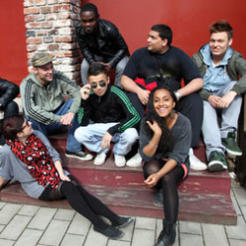As discussion abounds on charities’ ability to adapt to the digital age, Kelley Temple, senior campaigns officer at CAF, explains why the answer might be under our noses.
The problem
Roger von Oech, the toy-maker and expert in creativity, once said: “It’s easy to come up with new ideas; the hard part is letting go of what worked for you two years ago, but will soon be out of date.”
His words strike to the very heart of many anxieties as organisations drive forward in an uncertain economic climate. Why take that risk? Why put resources into an unknown? Why let go of what you are doing?
This has never been more true than for charities - this week we saw reports that charity trustee boards are failing to adapt to the digital age. Lloyds Bank’s 2015 research found that 58 per cent of charities are without basic digital skills – a 3 per cent increase on last year. The same amount - 58 per cent - do not believe that having a website increases their funding. This is all the more surprising next to the fact that 92 per cent of the UK population is online.
Digital methods are core to the way all organisations engage with their supporters, customers and clients and by not taking advantage of them, charities put both their funding and their futures at risk.
The solution
Finding solutions is, for want of a better word, scary. Especially when the well-worn tracks to problem-solving within an organisation are no longer effective.
But this disjointed moment is exactly when an organisation can innovate.
This is the moment that charities should ask - how do we want to progress? Do we want more supporters? More donors? Do we want better connections with our service users and our volunteers? Do we want to tell stronger stories more effectively to more people, or do we want to rely on the ideas of a few years ago?
And this is where young people come in.
Here at Charities Aid Foundation we have been working to help charities increase the proportion of young people (aged 35 and under) who are charity trustees. In September 2015 in partnership with young trustee Leon Ward we launched the Young Trustees Guide - a practical guide for young people who are or are considering becoming a trustee and charities who are looking to strengthen their governance.
Our purpose was - and is - to secure the future of charities. The Young Trustees Guide developed out of our Growing Giving Campaign - a product of a Parliamentary inquiry into the issues that need to be tackled for a strong charitable sector to flourish.
Young people as trustees
Today only 2 per cent of charities have a young trustee on their board despite research showing that 85 per cent of people under the age of 35 would consider becoming a trustee. While I am not arguing that just because young people are digital natives they will hold the key to every charity’s digital future, they can play a key role in helping to begin the process of innovation.
They are digitally engaged and they are open to new ideas – and if they have come to you hoping to be considered as a trustee, it means they believe in what you do. Charities that lack the digital know-how can draw on young people to find out where their solutions might lie.
Our conversations with NCVO and the #iwill campaign are helping to ensure both charities and young trustees get the support they need to make young trusteeship successful.
This presents an opportunity for charities that lack the digital fluency to get connected, stay relevant to their external environment and supporters and diversify and strengthen their governance.
Needless to say, we shouldn’t restrict young trustees’ opportunities to digital - conversations about the future of a charity need the fresh perspective of young minds, and willingness to ask tough questions.
We have been working with the Charity Commission of England and Wales and the Northern Irish Charity Commission to measure the proportion of young trustees and we will continue to do so. I very much hope this will go up.
Kelley Temple is senior campaigns officer at CAF, overall partner of the Charity Awards









